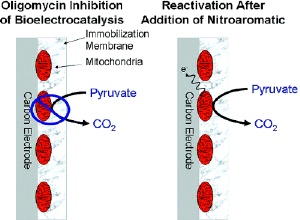Nov 14 2008
Researchers in Missouri have borrowed the technology that living cells use to produce energy to develop a tiny, self-powered sensor for rapid detection of hidden explosives. The experimental sensor, about the size of a postage stamp, represents the first of its kind to be powered by mitochondria, the microscopic "powerhouses" that provide energy to living cells, the researchers say. Their study is scheduled for the November 26 issue of the weekly Journal of the American Chemical Society.
 Bioelectrocatalysis mechanism of oligomycin inhibition of pyruvate oxidation at a mitochondria-modified electrode and nitroaromatic decoupling of a mitochondria-modified electrode. Copyright © 2008 American Chemical Society
Bioelectrocatalysis mechanism of oligomycin inhibition of pyruvate oxidation at a mitochondria-modified electrode and nitroaromatic decoupling of a mitochondria-modified electrode. Copyright © 2008 American Chemical Society
In the new study, Shelley Minteer, Marguerite Germain, and Robert Arechederra point out that today’s explosives detectors are expensive, bulky, and complex. Society needs smaller, cheaper, simpler detection devices, based on technology that perhaps could be incorporated into cell phones and portable digital music players, the researchers suggest.
The scientists describe development of an experimental sensor built from a special biofuel cell, essentially a battery-like device consisting of a thin layer of mitochondria sandwiched between a carbon-based electrode and a gas-permeable electrode. In laboratory studies using nitrobenzene as a test compound, the sensor showed a significant boost in electrical power in the presence of the substance, demonstrating the sensor’s potential for detecting TNT and related explosives, the researchers say. — MTS